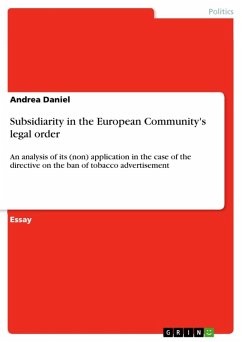Essay from the year 2009 in the subject Politics - Topic: European Union, grade: A-Grade with Distinction, South Bank University London (Faculty of Art and Human Sciences), course: European Policy, language: English, abstract: The essay analyses the question how EU-legislation on economic integration has shaped policy and decision-making processes as a "motor of political integration". Economic legislation, although on the first look restricted to one policy area and one "policy mode", can influence other areas and policy modes. Mainly focused on the example of the "Services Directive" the distribution of power between the EC institutions is analysed. At the same time the limits of economic integration in overcoming other political interests of Member States or interest groups like Trade Unions becomes visible. The Directive is a kind of "model case" of how a legislative act on economic policy can engage other policy fields, like social policy issues, labour market issues etc. At the same time it shows how economic or structural interests shift the political positions of MS as well as of interest groups, with groups which otherwise would form a solid block suddenly pursuing different goals. Therefore the Directive proves to be a good example of the complex multi-layer decision-making process on EC legislation. [...]
Dieser Download kann aus rechtlichen Gründen nur mit Rechnungsadresse in A, B, BG, CY, CZ, D, DK, EW, E, FIN, F, GR, HR, H, IRL, I, LT, L, LR, M, NL, PL, P, R, S, SLO, SK ausgeliefert werden.









